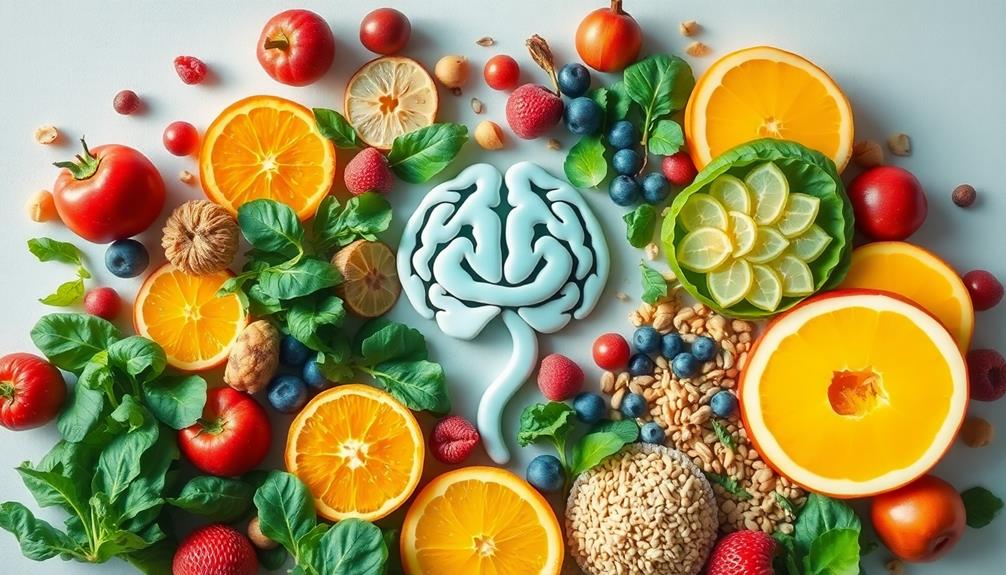Certain foods are crucial for your mental health, as they enhance mood and cognitive function. Nutrient-rich options, like omega-3 fatty acids found in fish and antioxidants in colorful fruits and vegetables, combat inflammation, which is linked to mood disorders. Diets such as the Mediterranean diet promote anti-inflammatory effects and support gut health, improving emotional regulation. Additionally, key vitamins, like D and magnesium, play essential roles in mood stabilization. By choosing diverse, nutrient-dense foods, you can positively impact your mental well-being. There's much more to explore about how food choices influence your mind and body.
Key Takeaways
- Nutrient-rich foods, such as omega-3 fatty acids, support neurotransmitter function and reduce inflammation, enhancing mood and cognitive function.
- Antioxidants found in colorful fruits and vegetables combat oxidative stress, lowering the risk of depression and supporting mental well-being.
- The Mediterranean diet's anti-inflammatory properties promote better mental health outcomes by reducing chronic inflammation linked to mood disorders.
- Vitamin D deficiency is associated with increased depression risk; foods rich in this nutrient can help regulate mood effectively.
- A diverse diet rich in nutrients supports the gut microbiome, influencing emotional regulation and mental health through the gut-brain connection.
Understanding Nutrition's Impact

Nutrition plays an essential role in your mental health, influencing everything from mood to cognitive function. When you choose nutrient-rich foods like fruits, vegetables, whole grains, and lean proteins, you're supplying your brain with the vitamins and minerals it needs to thrive.
For instance, traditional dishes such as Muamba De Galinha can provide essential nutrients while connecting you to cultural roots. Conversely, diets high in processed foods and refined sugars can lead to inflammation, negatively impacting your brain function and contributing to mood disorders such as depression and anxiety.
One effective way to enhance your mental health is by adopting the Mediterranean diet. This diet emphasizes a high intake of fruits, vegetables, legumes, and healthy fats, all of which promote better mental health outcomes.
Incorporating Omega-3 fatty acids from sources like fatty fish, flaxseeds, and walnuts can further support your brain's neurotransmitter function while reducing inflammation.
You should also focus on consuming a diverse range of colorful fruits and vegetables. These foods are rich in flavonoids and antioxidants, which can lower the risk of depression and support your overall well-being.
Key Nutrients for Mental Health

A balanced diet rich in key nutrients can greatly enhance your mental health. When you incorporate certain nutrients into your meals, you may find a positive shift in your mood and a reduction in depression symptoms. Here's a quick overview of some essential nutrients that promote mental well-being:
| Nutrient | Benefits |
|---|---|
| Omega-3 Fatty Acids | Reduces depression; anti-inflammatory |
| Vitamin D | Regulates mood; deficiency linked to depression |
| Antioxidants | Combats oxidative stress; improves mood |
| Magnesium | Essential for neurotransmitter function; alleviates anxiety |
| Folate | Supports dopamine production; lowers depressive symptoms |
Including Omega-3 fatty acids from fish, walnuts, and flaxseeds can help your brain function better. Vitamin D from sunlight or fortified foods is important for mood regulation. Antioxidants found in colorful fruits and veggies fight oxidative stress and enhance cognitive function. Magnesium, found in nuts and whole grains, plays a significant role in neurotransmitter function, easing anxiety. Finally, folate-rich foods like leafy greens support dopamine production, potentially reducing depression symptoms. By focusing on these nutrients, you're investing in your mental health.
The Role of Diet Patterns

Many people underestimate the impact of overall diet patterns on mental health. Your food choices can greatly influence your mood, cognitive function, and emotional well-being. Following a diet like the Mediterranean diet, which emphasizes fruits, vegetables, whole grains, and healthy fats, can lower your risk of depression.
These foods possess anti-inflammatory properties that help combat inflammation in the body, promoting better mental health outcomes. Additionally, incorporating diverse ingredients like Brazilian seafood dishes can provide essential nutrients that support cognitive function and emotional stability.
Research shows that diets rich in omega-3 fatty acids, found in fish and nuts, are linked to improved cognitive function and reduced anxiety and depression symptoms. In contrast, traditional Western diets high in processed foods, refined sugars, and unhealthy fats can increase inflammation and negatively affect your mood.
By opting for unprocessed foods and reducing your intake of unhealthy fats, you could lower your depression risk by 25%-35%.
Additionally, consuming a diverse array of nutrient-dense foods enhances your gut microbiome, which plays a vital role in the gut-brain connection. A healthy gut can lead to improved emotional regulation and overall mental health, making it clear that the right diet patterns can deeply affect your psychological well-being.
Inflammation and Mood Disorders

Chronic inflammation importantly impacts mental health, contributing to mood disorders like depression and anxiety. Research shows that individuals with higher inflammatory markers are more susceptible to these conditions. This connection highlights the importance of managing inflammation for better mental health.
Incorporating nutritious dishes like Nettle and Potato Soup or Heirloom Bean Stew can provide essential nutrients that combat inflammation and promote well-being.
One effective way to combat inflammation is through diet. The Mediterranean diet, packed with anti-inflammatory foods such as fruits, vegetables, whole grains, and healthy fats, has been linked to a lower risk of developing mood disorders. Incorporating omega-3 fatty acids, found in fish and certain nuts, can greatly alleviate depressive symptoms and enhance overall mental health.
Conversely, high-calorie diets rich in saturated fats and sugars can trigger increased inflammation, which may worsen cognitive function and mood disturbances. It's vital to adopt dietary changes that prioritize anti-inflammatory foods to support your mental well-being.
Moreover, intervention studies reveal that anti-inflammatory medications can reduce symptoms of depression, further underscoring the role of inflammation in mood regulation.
Brain-Gut Connection

Connecting the dots between your gut health and mental well-being reveals a fascinating relationship that greatly affects your mood. The gut microbiota communicates with your brain through neural, inflammatory, and hormonal pathways, highlighting its role in mental health. Approximately 95% of serotonin, an essential neurotransmitter for regulating mood, is produced in your gastrointestinal tract. This connection emphasizes the need to maintain a healthy gut to support emotional stability.
Research links alterations in the gut microbiome with mood disorders, including major depressive disorder. Your dietary patterns considerably influence this microbiome. For instance, the Mediterranean diet fosters beneficial microbial diversity, which can enhance mood and reduce inflammation.
Here's a quick overview of how various factors relate to the brain-gut connection:
| Factor | Impact on Mental Health |
|---|---|
| Gut Microbiota | Influences brain function and mood |
| Serotonin Production | Key in regulating emotional balance |
| Dietary Patterns | Shapes gut health and diversity |
| Inflammation | Linked to mood disorders |
| Mediterranean Diet | Promotes beneficial gut bacteria |
Understanding this connection empowers you to make dietary choices that can positively affect your mental health.
Mindful Eating Practices

When you practice mindful eating, you become more aware of your emotions and how they influence your food choices.
Incorporating traditional dishes such as Red-Braised Pork Belly can enhance your dining experience by offering rich flavors that evoke comfort and nostalgia.
Creating a calming eating environment helps you focus on your meals, reducing distractions that can lead to mindless eating.
Emotional Awareness During Eating
Enhancing your emotional awareness during meals can greatly improve your relationship with food. Mindful eating encourages you to pay full attention to your eating experience, which can markedly boost your emotional awareness. By doing this, you'll find it easier to recognize your hunger and fullness cues, supporting a healthy diet and promoting better food choices.
For instance, enjoying classic Southern dishes like satisfying squash casserole can enhance your mealtime experience, as you savor the flavors and textures involved.
Keeping a food journal is a practical tool that helps you identify emotional triggers that influence your eating habits. This awareness can lead to healthier choices and better psychological wellbeing.
When you take the time to chew slowly and savor each bite, you can truly appreciate the food's taste and texture, enhancing your satisfaction with smaller portions.
Incorporating emotional awareness into your meals allows you to connect with your food on a deeper level. You'll find that this practice transforms your eating habits, making meals more enjoyable and less about mindless consumption.
Calming Eating Environments
Creating a calm eating environment greatly impacts your overall dining experience and mental wellbeing. When you remove distractions like televisions and smartphones, you encourage mindful eating, allowing you to focus on the flavors and textures of your food. This practice can be particularly enhanced by incorporating traditional dishes, such as Khao Niao Sangkhaya, which offers a delightful balance of creamy custard and sticky rice that encourages savoring each bite.
This leads to greater satisfaction and often results in healthier dietary choices, as you become more attuned to your hunger cues.
Designating a specific, pleasant space for meals can notably improve digestion and help cultivate a positive emotional state. By scheduling smaller, more frequent meals in a serene environment, you can regulate your appetite and reduce stress-related eating patterns.
This calm atmosphere not only helps you enjoy your food but also eases emotional states that might otherwise lead to overeating or unhealthy choices.
Keeping a food journal to track your emotional states while eating can reveal triggers that influence your eating behavior. By identifying these patterns, you can make more conscious decisions and foster healthier dietary choices.
Ultimately, creating calming eating environments encourages a mindful approach to meals, enhancing your overall mental health and wellbeing.
Barriers to Healthy Eating

When you try to eat healthier, financial constraints can make it tough to access nutritious foods.
For instance, many people may find it challenging to prepare meals that utilize leftovers, like a delicious turkey soup made from leftover turkey, which can be both comforting and economical.
If you live in a food desert, fresh produce might feel out of reach, impacting your mental health.
Plus, without proper education on nutrition, you might struggle to make informed choices that support your well-being.
Financial Constraints on Nutrition
Many people find that financial constraints can severely limit their access to nutritious foods, making it challenging to maintain a healthy diet. When you're facing economic hardships, you might often turn to cheaper, processed options instead of fresh fruits and vegetables, which are essential for good nutrition and mental health.
For instance, preparing wholesome meals like Mushroom Masala or Gobi Manchurian can be both affordable and nutritious, yet these options may be overlooked in favor of less healthy choices. Research shows that low-income households can spend over 30% of their income on food, leaving little room for healthier choices.
Food insecurity is a significant issue, associated with a 50% higher risk of depression and anxiety. It highlights how limited access to healthy food directly impacts your mental well-being. Transportation challenges and a lack of fresh produce in low-income neighborhoods only worsen the situation.
Furthermore, the psychological stress from financial instability can lead to emotional eating, where you might reach for unhealthy comfort foods. This creates a cycle of poor nutrition and declining mental health, making it even harder to break free from these financial constraints.
Recognizing these barriers is the first step toward finding solutions to improve your access to nutritious food, ultimately enhancing both your nutrition and mental health.
Environmental Access Issues
Access to fresh, nutritious foods is a significant challenge in many low-income neighborhoods, often resulting in food deserts where healthy options are scarce. In Ethiopian cuisine, for example, dishes like Yekolo (Roasted Barley) highlight the use of locally sourced ingredients that can be both healthy and affordable.
You might find it frustrating when financial constraints limit your ability to purchase high-quality, nutrient-rich foods. As a result, you may rely more on cheaper, processed options that don't offer the same mental health benefits.
Transportation barriers can further complicate your ability to reach supermarkets and farmers' markets, making it difficult to obtain fresh produce. Without reliable access, you're more likely to settle for what's nearby, which often includes low-quality food vendors and high-density fast-food outlets.
These environmental factors can severely shape your dietary choices and lead to unhealthy eating habits.
Additionally, the limited availability of nutritional education and resources in your community might prevent you from making informed decisions about your diet. This lack of knowledge can perpetuate unhealthy eating patterns and contribute to poor mental health outcomes.
Mental Health Impact
Although financial constraints can create significant barriers to healthy eating, the impact on mental health is often even more profound. When you struggle to afford nutritious options, it can lead to a reliance on processed and refined foods that don't support your mental well-being.
Incorporating traditional foods like Dorayaki (Red Bean Pancake) or Umeboshi can provide not only delicious alternatives but also essential nutrients that contribute positively to mental health.
Here are three key barriers you might face:
- Food Deserts: Limited access to fresh produce and unprocessed foods can make it nearly impossible to maintain a balanced diet. The lack of options often pushes you towards unhealthy alternatives.
- Psychological Factors: Stress and depression can trigger unhealthy eating habits, causing you to crave high-fat, high-sugar fast foods instead of nutrient-rich meals that can enhance your mood.
- Educational Gaps: If you're not educated about nutrition, making informed choices becomes a challenge. This lack of knowledge can perpetuate cycles of poor dietary habits, further impacting your mental health.
Addressing these barriers is essential for fostering healthy eating habits that promote better mental health.
Future Research Directions

Future research on the link between diet and mental health should prioritize understanding the specific mechanisms at play. For instance, exploring how dietary patterns, like the Mediterranean diet, exert anti-inflammatory effects could be essential in alleviating symptoms of depression and anxiety.
You might discover that the gut-brain axis plays a pivotal role in this relationship. Investigating how changes in gut microbiota from dietary modifications influence mood regulation can deepen your insights into mental health outcomes.
Additionally, larger-scale interventional studies are necessary to establish clear causal links between key nutrients, such as omega-3 fatty acids and polyphenols, and their effects on mental health.
It's equally important to examine food insecurity and access to healthy foods, as these factors shape mental health disparities, particularly in vulnerable populations.
Frequently Asked Questions
How Do Certain Foods Affect Mental Health?
Certain foods impact your mental health by providing essential nutrients that support brain function. Eating nutrient-dense options boosts mood, while processed foods can lead to fluctuations that cause anxiety and depression. Your diet plays a vital role.
What Are 5 Foods to Avoid for Mental Health?
To support your mental health, avoid highly processed snacks, refined sugars, saturated fats, trans fats, and artificial additives. These can disrupt your mood, energy levels, and overall cognitive function, ultimately impacting your emotional well-being.
What Is the Connection Between Food and Psychology?
Food directly affects your psychology by influencing mood and cognition. Nutrient-rich foods boost neurotransmitter production, while unhealthy options can cause inflammation, leading to negative emotional states. Your dietary choices substantially shape your mental well-being.
What Are 5 Ways to Improve Mental Health?
Imagine your mind as a garden; nourish it with vibrant fruits, vegetables, and lean proteins. Practice mindful eating, stay hydrated, maintain balanced meals, and keep a food journal to cultivate flourishing mental health.
Conclusion
Incorporating nutrient-rich foods into your diet is like planting seeds in a garden; with care and attention, you'll cultivate a flourishing mind. By understanding the role of specific nutrients and adopting mindful eating practices, you can nourish both your body and mental well-being. As research continues to uncover the connections between diet and mental health, remember that every meal is an opportunity to nurture your mental landscape and grow towards a brighter, healthier future.








